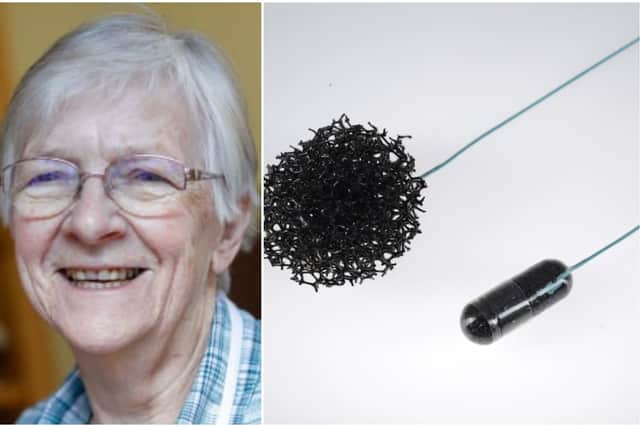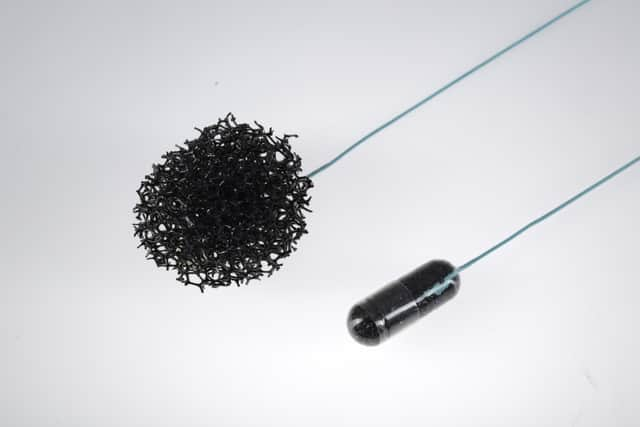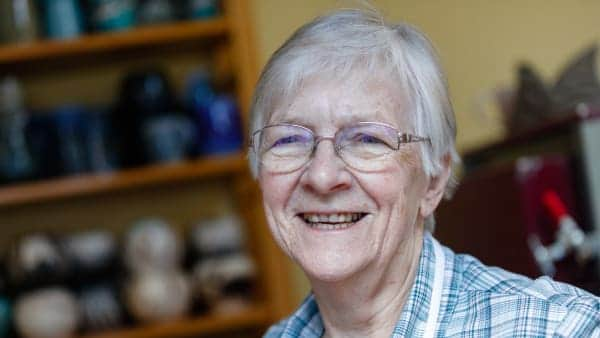Oesophageal Cancer: what is the cytosponge trial? How it saved one woman’s life by catching her cancer early
This article contains affiliate links. We may earn a small commission on items purchased through this article, but that does not affect our editorial judgement.
and live on Freeview channel 276
A woman has told of how taking part in a clinical trial for an early cancer detection test “really did save her life.”
Liz Chipchase, 72, who had suffered from acid reflux for around 40 years, agreed to take part in a trial for the cytosponge which revealed she had oesophageal cancer - albeit at an early stage.
Advertisement
Hide AdAdvertisement
Hide AdOesophageal cancer, which is among the six least survivable cancers, can be difficult to treat and many people are not diagnosed until it is at an advanced stage.
It was in 2017 when she was invited by her GP to take part and, Liz, who is from Cambridge, had been taking medication for the acid reflux.
What prompted her to take part in the trial?


The cytosponge is used to detect Barrett’s Oseophagus, but can also detect if cancer has developed.
Speaking to NationalWorld as Oesophageal Cancer Awareness Month draws to a close, Liz said: “I have taken part in trials before but I don’t always take part when asked, so I thought the cytosponge was just such a genius device, so simple and so easy and the trial consisted entirely of just going to your GP, swallowing the cytosponge there and having it hauled out and then sent to be tested.
Advertisement
Hide AdAdvertisement
Hide Ad“And that was all, it wasn’t one of those trials where you are going back and forwards to give blood or anything.
“I’d never heard of this condition Barrett’s Oseophagus before which is what it was looking for, which is what I discovered - I read up and it was a change in cells in the oesophagus.
“For most people it doesn’t matter at all but for a small proportion the Barrett’s cells can then change again and become cancerous.
“I thought yeah I’ll take part, it was very casual, I could quite easily have decided the other way, but fortunately I didn’t because making that decision to take part in the trial really did save my life I’m sure.”
What was involved in taking the test?
Advertisement
Hide AdAdvertisement
Hide AdLiz, who does voluntary work with Heartburn Cancer UK, said the process was quite simple when she went along to her GP for the test.
She said: “It was really easy it was so much easier than an endoscopy - it took 10 minutes and I swallowed the cytosponge not a problem.
“I really did forget all about it, but a couple of weeks later I got a letter saying the test had come back but I was positive.”
She was told not to be unduly concerned and that they wanted to check the result was correct by doing an endoscopy.
Advertisement
Hide AdAdvertisement
Hide AdAfter around six weeks she went for an endoscopy and said she could see her oesophagus was “not in very good shape”. It was inflamed and seemed to be ulcerated and bleeding in places.
As a result of what was seen on the endoscope the medication dose she was taking was increased.
However, Liz did start to become concerned, saying: “I did begin to think at that point is there something really wrong? But I felt absolutely perfectly alright - I couldn’t believe I could have cancer and feel fine. I was in perfectly good health.”
“I had a week of thinking it could be serious.”
She then got a call to go to a clinic.
Speaking of the moment she found out she had cancer, Liz said: “It was such a speedy turn around that I did begin to worry and I thought this doesn’t sound like good news, and I walked into the clinic I could tell from the faces that greeted me that it wasn’t good news.
Advertisement
Hide AdAdvertisement
Hide AdIt was cytosponge inventor Professor Rebecca Fitzgerald who broke the news.
Liz said: “That was the first time I met Rebecca and she had to tell me I had cancer.
“At that stage I didn’t know how advanced it was so I had another endoscope done with lots of biopsies.”
What treatment did Liz have for her cancer?


Luckily for Liz as it was caught so early it could be treated via the endoscope in a process called a resection.
Advertisement
Hide AdAdvertisement
Hide AdShe said: “Probably within a fortnight I knew it had been caught at a really early stage and it could be treated through the endoscope so I didn’t have to have any horrible treatments like chemotherapy or an operation all I had to do was go along and have another endoscopy under sedation this time.”
The resection saw the surface of the affected area removed and pinched off, with Liz saying they removed 16 little patches. Other than sticking to soft foods for a few days the process did not have a huge impact on her.
Once she had healed, more biopsies were taken and she was given a choice of having her oesophagus removed which meant she would certainly be clear of cancer, or having another resection.
She ultimately opted for the second resection as removal of the oesophagus is a major operation with a long recovery period.
Advertisement
Hide AdAdvertisement
Hide AdLiz said: “One of the biopsy samples had been touching a lower layer they said there was a 3% chance the cancer could have moved into that layer.
“Because a resection is so much easier than removing your oesophagus I opted for another resection thinking if the cancer has moved down I can still have my oesophagus taken out it would delay things by a month or two, but it won’t make that much difference so I’d rather keep my oesophagus if I can.”
How has she been since?


Liz realises the decision to take part in the trial was life changing for her, saying: “Because I felt so well I didn’t think I had any problems with my oesophagus beyond the usual acid reflux which I had just grown used to as I’d had it for so long.
“I’d never have gone to my GP I would never had said ‘I’ve got a problem’ because I didn’t, I could swallow perfectly well I could eat more or less any type of food.
Advertisement
Hide AdAdvertisement
Hide Ad“It would have had got to the stage where the cancer had got big enough to impede my eating - by which time obviously it would have gone much deeper and spread through other parts of my body as well. It caught me just in time probably another six months and the cancer would have spread down into my oesophagus and I would have lost my oesophagus. I was so fortunate, I was so lucky.”
She has received screening in the years since she had cancer, first every three months, then six before going on to yearly checks. Her medication was reduced, however the inflammation came back and she has a endoscopy in three months time.
She added: “They keep an eye on me to make sure everything is fine - but it’s nothing like having to have full cancer treatment.”
Liz thinks it’s essential people realise they should never ignore indigestion, saying: “It’ s not a good idea - just go and get it checked out.
Advertisement
Hide AdAdvertisement
Hide Ad“A lot of people are frightened of endoscopies which is the standard way of looking at it, but the cytosponge is so much easier and much less painful.
“Spreading the word about the cytosponge and about not ignoring any indigestion symptoms is I think crucial. It’s going to make such a difference to the number of people who go onto develop stage 3 and 4 cancer.”
A message from the editor:
Thank you for reading. NationalWorld is a new national news brand, produced by a team of journalists, editors, video producers and designers who live and work across the UK. Find out more about who’s who in the team, and our editorial values. We want to start a community among our readers, so please follow us on Facebook, Twitter and Instagram, and keep the conversation going. You can also sign up to our email newsletters and get a curated selection of our best reads to your inbox every day.
Comment Guidelines
National World encourages reader discussion on our stories. User feedback, insights and back-and-forth exchanges add a rich layer of context to reporting. Please review our Community Guidelines before commenting.
